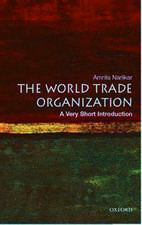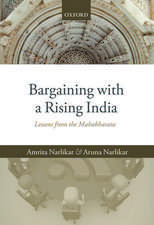Deadlocks in Multilateral Negotiations: Causes and Solutions
Editat de Amrita Narlikaren Limba Engleză Paperback – 5 mai 2010
| Toate formatele și edițiile | Preț | Express |
|---|---|---|
| Paperback (1) | 284.49 lei 6-8 săpt. | |
| Cambridge University Press – 5 mai 2010 | 284.49 lei 6-8 săpt. | |
| Hardback (1) | 772.88 lei 6-8 săpt. | |
| Cambridge University Press – 5 mai 2010 | 772.88 lei 6-8 săpt. |
Preț: 284.49 lei
Nou
Puncte Express: 427
Preț estimativ în valută:
54.43€ • 56.84$ • 44.95£
54.43€ • 56.84$ • 44.95£
Carte tipărită la comandă
Livrare economică 15-29 aprilie
Preluare comenzi: 021 569.72.76
Specificații
ISBN-13: 9780521130677
ISBN-10: 0521130670
Pagini: 336
Ilustrații: 4 b/w illus. 7 tables
Dimensiuni: 152 x 228 x 15 mm
Greutate: 0.52 kg
Editura: Cambridge University Press
Colecția Cambridge University Press
Locul publicării:Cambridge, United Kingdom
ISBN-10: 0521130670
Pagini: 336
Ilustrații: 4 b/w illus. 7 tables
Dimensiuni: 152 x 228 x 15 mm
Greutate: 0.52 kg
Editura: Cambridge University Press
Colecția Cambridge University Press
Locul publicării:Cambridge, United Kingdom
Cuprins
Introduction Amrita Narlikar; Part I. Disciplinary Insights: 1. The politics of deadlock Andrew Gamble; 2. From Bretton Woods to Havana: multilateral deadlocks in historical perspective Martin Daunton; 3. Talking one's ways out of strikes William Brown; 4. Litigating the way out of deadlock: the WTO, the EU and the UN Markus W. Gehring; Part II. Case Studies: 5. Transatlantic intransigence in the Doha Round: domestic politics and the difficulty of compromise Alasdair R. Young; 6. Know the enemy: uncertainty and deadlock in the WTO Amrita Narlikar and Pieter van Houten; 7. Entering the zone of agreement: the United States in climate change negotiations Sevasti-Eleni Vezirgiannidou; 8. The role of informal negotiation processes in breaking deadlocks: the UN Security Council Jochen Prantl; 9. Negotiating international policies on Kosovo Pieter van Houten; 10. Beyond negotiation deadlocks: the importance of mediation and leadership change Jacob Bercovitch and Carmela Lutmar; Conclusion. Case studies as evidence: lessons learned Daniel Druckman and Amrita Narlikar.
Recenzii
'This remarkable and insightful volume is of great value to practitioners and analysts who deal with deadlocks that may arise in multilateral negotiations of various kinds. The range of solutions available for resolving the different types of deadlocks is set out especially clearly and comprehensively.' Robert M. Stern, University of Michigan
'Amrita Narlikar, an influential analyst of the issues relating to multilateralism, has brought together some of the best contributions to this hugely important subject. She deserves our gratitude and attention.' Jagdish Bhagwati, Columbia University and author of In Defense of Globalization
'This theoretically-sophisticated book makes a significant contribution to the literature on negotiation. Its focus on the multilateral level is particularly timely given the current stalemate in many global negotiations.' John Ravenhill, Australian National University
'Amrita Narlikar offers us a path-breaking theory to understand deadlocks in multilateral negotiations. All the writers in this volume engage with this theory – from the standpoint of different disciplines; law, politics, economics, history, and international relations – and help to illuminate our understanding of why deadlocks arise in multilateral negotiations. This book is a 'must read' for students and practitioners of multilateral negotiations concerned with finding solutions to the many global challenges of our time in trade, climate change and security issues!' Faizel Ismail, Head of the South African Delegation to the WTO, and author of Mainstreaming Development in the WTO: Developing Countries in the Doha Round (2007) and Reforming the World Trade Organization: Developing Countries in the Doha Round (2009)
'Amrita Narlikar has put together a valuable collection of essays on the ingredients of success and failure in multilateral negotiations. The approach is multi-disciplinary, as well as being both theoretical and empirical. This book has a coherent and disciplined structure, as the authors of individual chapters relate their analyses to the conceptual framework laid out at the start by Narlikar. The volume makes a useful contribution to our thinking about the dynamics of negotiation and how to understand their results.' Patrick Low, Chief Economist, World Trade Organization
'Amrita Narlikar, an influential analyst of the issues relating to multilateralism, has brought together some of the best contributions to this hugely important subject. She deserves our gratitude and attention.' Jagdish Bhagwati, Columbia University and author of In Defense of Globalization
'This theoretically-sophisticated book makes a significant contribution to the literature on negotiation. Its focus on the multilateral level is particularly timely given the current stalemate in many global negotiations.' John Ravenhill, Australian National University
'Amrita Narlikar offers us a path-breaking theory to understand deadlocks in multilateral negotiations. All the writers in this volume engage with this theory – from the standpoint of different disciplines; law, politics, economics, history, and international relations – and help to illuminate our understanding of why deadlocks arise in multilateral negotiations. This book is a 'must read' for students and practitioners of multilateral negotiations concerned with finding solutions to the many global challenges of our time in trade, climate change and security issues!' Faizel Ismail, Head of the South African Delegation to the WTO, and author of Mainstreaming Development in the WTO: Developing Countries in the Doha Round (2007) and Reforming the World Trade Organization: Developing Countries in the Doha Round (2009)
'Amrita Narlikar has put together a valuable collection of essays on the ingredients of success and failure in multilateral negotiations. The approach is multi-disciplinary, as well as being both theoretical and empirical. This book has a coherent and disciplined structure, as the authors of individual chapters relate their analyses to the conceptual framework laid out at the start by Narlikar. The volume makes a useful contribution to our thinking about the dynamics of negotiation and how to understand their results.' Patrick Low, Chief Economist, World Trade Organization
Descriere
Examines the causes and consequences of deadlocks in multilateral settings, and analyses strategies for breaking them.



















